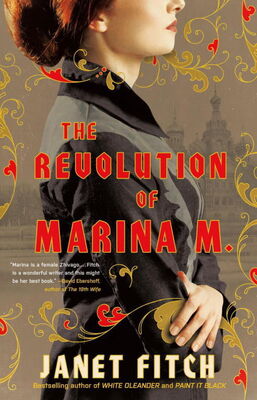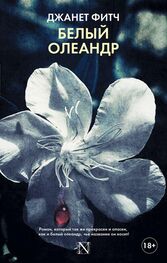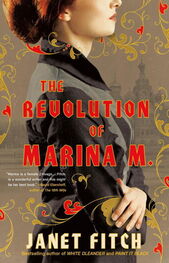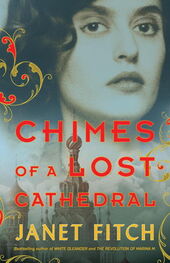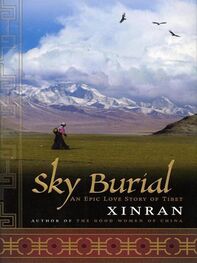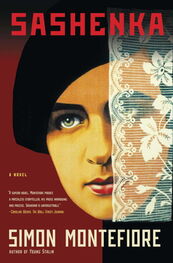Grandfather Golovin glared out from his silver frame, beleaguered and outraged, bushy white eyebrows like snowy eaves over his beautiful old eyes. Sorry, Dyedushka, but it’s 1919, not 1875. You’re going to be a great-grandfather. We’ve got to be practical, you and I. At least he was here, in his village, where they knew him, with his family all around, if only in photographs. All I pray is that I’m buried in Russia, Avdokia liked to say. For myself, I had no idea how much longer I would sojourn, how many miles I would walk, how many years. To live was the thing.
I stayed at Olya’s until she found a ride for me into Tikhvin, a neighbor with a load of wood to sell. I left Novinka on top of a sledge heading for town, pulled by a little swaybacked mare. For the food she fed me I paid cash but managed to cajole her into parting with one of my grandmother’s silver salt cellars in exchange for the ride. “It’s only pewter,” I told her. Though I noticed she had no trouble convincing the old man it was sterling. How appropriate that my ride had been purchased with salt.
I sat atop the load and looked back—oh, yes I did—my hungry eyes drinking in every detail. The dogs sniffing the new drifts. A boy running out of a gate, red-cheeked, his young mother shouting, “Don’t forget your brother!” Nostalgia gored me like a bull. The smaller child, so thickly clad he looked like a ball, arms sticking out on either side, toddled after him. When Seryozha was that age I had to take him with me everywhere. The load, redolent with the sticky smell of new-cut pine, shifted beneath me as the sledge slid and jolted in a lane freshly scored with runner marks.
Maryino—already lost. The house with its dark logs, the lilac bush, the painted cabinets, my mother wrapped in mists and visions. A fox running in the snow. Seryozha lying on his stomach in the front parlor, cutting figures from an old Paris fashion catalog. A fallen tree over the river. Floating along in the lazy green—then crossing it again with Andrei Ionian. The larch proud in the yard, the larch cut down. Ionians spinning in perfect synchrony, an egg stained red with beet juice. I folded all these images in half, in quarters, over and over again, and pressed them, hard nuggets of memory, into the center of my forehead.
The horse labored hock deep through the new snow, its harness creaking. Olya’s old neighbor lit his pipe. A woman came out onto her porch and threw a basin of water into the yard, and I saw Mother in white coming off the veranda at Maryino in a hat like a wheel. My governess in a straw boater, calling me as I drifted deeper into the trees. Marina… Volodya, standing on the back of a fat pony. And that young girl in green, walking barefoot along a rope tied between two trees.
Marina…
I would remember this: the brush of the runners over the new snow, the squeak of the sledge as the hamlet shrank into the past. First the pines disappeared, then the aspen-shingled church, the sooty barn of the blacksmith’s shop, and Lyuda’s pretty house. Now the dogs, the gates, the children. At last Novinka itself blurred and vanished into the fog, like a sketch in pencil rubbed out by a thumb.
End of Book I
The people to whom I owe gratitude in the writing of this book would populate a small but extremely beautiful city. First, I would like to offer thanks to the heroes of my writing life, my writers’ group, David Francis, Rita Williams, and Julianne Ortale, whose unfailing support saw this book through its long gestation. Also to my daughter, Allison Strauss, whose sharp eye proved instrumental in shaping the version of the novel you hold in your hands today. To my tireless editor, Asya Muchnick, at Little, Brown, who took on Marina’s epic journey without a backward look. Thanks to the rest of the team at Little, Brown, and especially Karen Landry, who moved mountains for this book. To my agent and champion, Warren Frazier at John Hawkins and Associates, ever in my corner as the book and I went eighty rounds, and to Bill Reiss, for changing my life. Thank you to Boris Dralyuk, gentle friend and sounding board, for your insights and for creating original translations for much of the Russian poetry that appears in this book. To the irreplaceable Dr. Judson Rosengrant, close reader and literary Virgil into the manners and mores of the Russian intelligentsia. And thank you to my earliest reader, Jane Chafin, for your curiosity and long friendship.
Depthless gratitude goes to the Likhachev Foundation of St. Petersburg, Russia, the research fellowship that opened Marina’s world for me. Without you, I would still be pressing my nose to the windows of Revolutionary Petrograd. Instead, you swung wide the doors. Thank you with all my heart to Alexander Kobak, Elena Vitenberg, Inna Sviderskaya, Anna Shulgat, Sasha Vasiliev, Boris Poleschuk, and Ksenia Pikaliova (Kobak) for your generosity and care. Through my Likhachev fellowship, I was able to reach out to some of the most prestigious cultural institutions in St. Petersburg. At the Anna Akhmatova Museum, many thanks to director Nina Popova; Tatyana Poznyakova, head of the Education Department; and Masha Korosteleva, curator. At the Museum of Political History, my gratitude to curators Alexander Kalmyov and Alexey Kulegin. At the Museum of the City of St. Petersburg, I thank research secretary Irina Karpenko and deputy director Julia Demidenko. At the Dostoyevsky House Museum, thank you to deputy director Vera Biron for the tour of the Dostoyevsky district and having me speak about this project at the museum. And special thanks to translator Eireene Nealand for alerting me to the Likhachev Foundation, and for introducing me to contemporary St. Petersburg poets. And thanks to Tobin Auber, editor of the St. Petersburg Times, for your warm welcome and insider views. And abiding gratitude to Andrey Nesteruk and his parents for their memorable tour of hidden St. Petersburg.
Research was the oxygen in the water of this novel. I thank the eminent Russian historians Alexander Rabinowitch and Arch Getty, social historian Choi Chatterjee, and art historian John Bowlt for their precious help, as well as the H-Russia Listserv, and teacher and translator Natalya Pollack. I thank the USC libraries for the richness of their collection and my access to it, and Reed College, whose 2007 alumni trip under the guidance of Dr. Rosengrant informed so many aspects of this work.
Novelists not only require the world, they also require retreat from the world, and I have found many a kind harbor for myself and my crates of binders and books. Many thanks to those who offered me shelter and the gift of time—Eduardo Santiago and Mark Davis of Idyllwild, California; David Lewis and Liz Sandoval of Portland, Oregon; Brett Hall Jones, Louis Jones, and the Hall family of Squaw Valley, California; Andrew Tonkovich and Lisa Alvarez of Modjeska Canyon, California; Jan Rabson and Cindy Akers of Salt Spring Island, British Columbia; Wendy Goldstein and Sharon Smith of Manitou Springs, Colorado; Sally Wright of Idyllwild, California; and the Helen R. Whiteley Fellowship, University of Washington Friday Harbor Laboratories, San Juan Island, Washington.
Though they live only in my heart now, I would like to thank my father, Vernon Fitch, who long ago put Dostoyevsky into my restless hands, leading me into a lifelong love of Russia, and my mother, Alma Fitch, who taught me that girls can do anything.
Most of all, I want to thank my most generous husband, Andrew John Nicholls, who stuck with me throughout this long labor, read so many drafts, calmed so many storms, cheered me when it looked bad, and encouraged me to celebrate prematurely whenever possible. “If you don’t celebrate prematurely,” he says, “you’ll never taste champagne.” I love you more than I can say.
Читать дальше